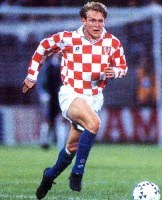
I saw the other day a club chief executive moaning about the wages the club pays to the players at the club, I can't remember who he was but it just annoyed me. There he was smoking a big cigar, driving a brand new Bentley, doing nothing for the club, bar taking a big fat pay packet of his own while not actually getting out on the pitch and making a difference for the club.
Now don't get me wrong I think he had a point. There are players at every club that just because they are being paid at all means they are receiving too much. But it's the fact that the people that are telling us players get too much are the ones that are taking money away from the game that makes me think that maybe players are not getting paid too much.
Though having said that a lot do get riches beyond the amount their ability deserves. A few examples spring to mind immediately: Robbie Savage, OK a good player but is he really that good, that he is able to afford to drive a Ferrari? Not in my eyes he's not. He is far too busy play acting for my liking. Then there is Tim Sherwood, OK he may of won a League Championship medal while at Blackburn but was he really anything other than a good player?
Again I would say no, he was just lucky to be playing in the EPL before the big star influx raised the level of ability needed to make it. but at a time when the big money had entered the game. But in my view the biggest example of an overpaid footballer is Ian Walker, surely the worst 'keeper the EPL has seen, even when he dropped down a flight with Leicester he was no better than average.
However, when you see the likes of Gianfranco Zola, Thierry Henry, Ronaldinho and Pavel Nedved. These are players that make a match worth watching just to see them, it doesn't matter what team they play for it's all about them and their ability to produce magical skills that make your jaw drop in admiration.
Maybe a better answer to the question would be yes some are, but no others are not. Though of course that doesn't make for good headlines when a player signs a new contract.
Lets be honest how many Manchester United fans begrudge Roy Keane a single penny he made from the club? But that didn't stop the newspapers whining about the massive sums he was making, well so what? It is nothing compared to the sums that the likes of Martin Edwards made from Manchester United yet Edwards was not the one out on the pitch knowing that his career could be over tomorrow if he receives a bad challenge.
Sometimes I think its just jealousy that creates these headlines about overpaid players, or maybe its just a complete lack of anything interesting to write that leads to it? Either way I would rather they gave both sides of the story before whinging about it. I mean how about a list of the directors and shareholders of a club and how much they took in wages, bonuses and dividends? So that we can have a reference point to compare player's wages to. I would especially like to know how much the likes of Peter Ridsdale made from Leeds.
To my mind the only way forward is to take clubs back into the hands of the fans, like Wimbledon AFC and FC United. Let's have all their finances completely transparent, and get rid of agent's involvement in transfers. Surely the PFA could offer that as one of their services to their union members, after all they certainly have the money. Surely all clubs need to do transfers between themselves is a solicitor, a representative and an FA, UEFA or FIFA or whoever representative to make sure it is all legal and above board.
I know this will never happen as too many people are busy creaming off money from the game to line their own pockets. But at the end of the day it should be about the fans - the players should all be on performance based contracts so they can earn massive amounts but only if the club does well and the ticket prices should be as low as possible so that as many fans as possible can afford to go.
Still this will never happen because too many people would lose out and at the end of the day football is no longer a sport it is a business and that will unfortunately never change.
The author is Tris Burke, the manager of http://www.football-rumours.com A large, frequently updated football / soccer web site dealing with all facets of the game.







